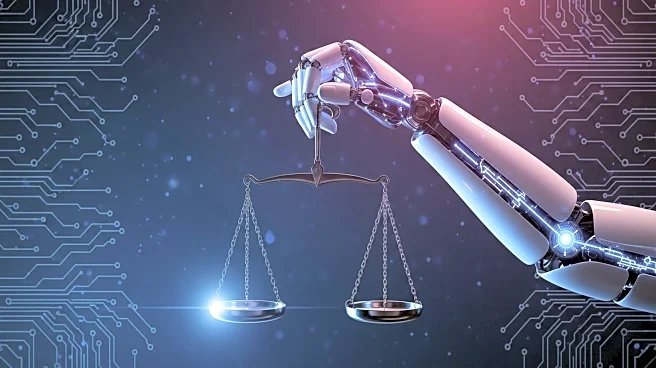What is the story about?
What's Happening?
Lawhive, an AI-powered legal tech company, has acquired a UK law firm, Woodstock, which specializes in property law. This acquisition marks a significant development as it is one of the first instances of a legal tech company purchasing a law firm. Lawhive's AI assistant, Lawrence, is designed to handle tasks such as drafting documents, conducting research, and managing cases, potentially reducing the need for human lawyers. The acquisition is notable because UK regulations allow non-lawyer entities to own law firms, unlike in the US. Lawhive, which operates in various practice areas including property, promises to offer legal services at reduced costs compared to traditional law firms. Google is a significant investor in Lawhive, which also operates in the US.
Why It's Important?
The acquisition of Woodstock by Lawhive could significantly impact the legal industry by shifting the traditional roles of lawyers to AI-driven processes. This move may lead to reduced staffing in law firms as AI tools take over tasks historically performed by legal professionals. The potential for AI to handle legal services raises questions about transparency and client awareness regarding the use of AI in their legal matters. As AI technology advances, the oversight required by human lawyers may diminish, potentially reshaping the legal service delivery model. This development could lead to cost pressures and client demands driving law firms to adopt AI solutions, fundamentally altering the relationship between lawyers and law firms.
What's Next?
The acquisition may set a precedent for future transactions where legal tech vendors acquire law firms to directly offer AI-driven legal services. This could lead to a transformation in how legal services are provided, with AI becoming the primary provider. The role of lawyers may shift to advisory and strategic functions, reducing the need for traditional law firms. As AI tools become more sophisticated, the necessity for human oversight may decrease, potentially leading to a new model of legal service delivery where law firms operate as online hubs. The industry will need to address ethical and accuracy concerns associated with AI handling legal tasks.
Beyond the Headlines
The acquisition raises ethical and transparency concerns regarding the use of AI in legal services. Clients may need to be informed about the extent to which AI is involved in their legal matters. The potential for AI to replace human lawyers could lead to significant changes in the legal profession, affecting employment and the traditional law firm structure. As AI technology continues to evolve, the legal industry will need to adapt to ensure ethical standards and accuracy in AI-driven legal services.














